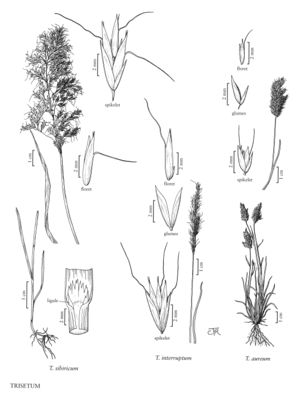Difference between revisions of "Trisetum aureum"
FNA>Volume Importer |
imported>Volume Importer |
||
| (5 intermediate revisions by 2 users not shown) | |||
| Line 4: | Line 4: | ||
|publications= | |publications= | ||
|common_names=Golden oatgrass | |common_names=Golden oatgrass | ||
| + | |special_status={{Treatment/ID/Special_status | ||
| + | |code=I | ||
| + | |label=Introduced | ||
| + | }} | ||
|basionyms= | |basionyms= | ||
|synonyms= | |synonyms= | ||
| Line 26: | Line 30: | ||
-->{{#Taxon: | -->{{#Taxon: | ||
name=Trisetum aureum | name=Trisetum aureum | ||
| − | |||
|authority=(Ten.) Ten. | |authority=(Ten.) Ten. | ||
|rank=species | |rank=species | ||
| Line 33: | Line 36: | ||
|basionyms= | |basionyms= | ||
|family=Poaceae | |family=Poaceae | ||
| + | |illustrator=Cindy Roché | ||
| + | |illustration copyright=Utah State University | ||
|distribution=N.J. | |distribution=N.J. | ||
|reference=None | |reference=None | ||
|publication title= | |publication title= | ||
|publication year= | |publication year= | ||
| − | |special status= | + | |special status=Introduced |
| − | |source xml=https:// | + | |source xml=https://bitbucket.org/aafc-mbb/fna-data-curation/src/200273ad09963decb8fc72550212de541d86569d/coarse_grained_fna_xml/V24/V24_1065.xml |
|subfamily=Poaceae subfam. Pooideae | |subfamily=Poaceae subfam. Pooideae | ||
|tribe=Poaceae tribe Poeae | |tribe=Poaceae tribe Poeae | ||
Latest revision as of 16:21, 11 May 2021
Plants annual, without sterile shoots; tufted. Culms 7-30 cm, glabrous, erect, spreading, or geniculate. Sheaths somewhat inflated, glabrous or villous; blades to 10 cm long, to 3 mm wide, flat, subglabrous to villous. Panicles 1-5 cm long, 0.5-3 cm wide, pyramidal to ovoid, dense, shiny, yellowish to tan. Spikelets 2.5-3.5 mm, with 2-3 florets. Glumes unequal; lower glumes 2-2.5 mm long, narrower than the upper glumes, 1-veined; upper glumes 2.5-3 mm, 3-veined; callus hairs 0.3-0.4 mm; lemmas 1.6-2.7 mm, glabrous or hairy, with wide hyaline margins, apices bifid, teeth to about 0.5 mm, awned, awns 2-6 mm, arising from above midlength and exceeding the apices, slightly bent; anthers 1-1.5 mm. 2n = unknown.
Discussion
Trisetum aureum is native to the Mediterranean region. It was collected from a ballast dump in Camden, New Jersey, in 1896 (Hitchcock 1951), and has not been reported since from the Flora region.
Selected References
None.
